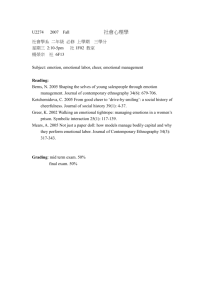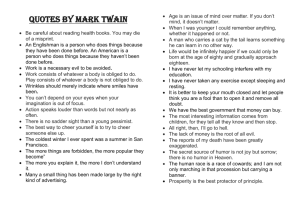Researching the future
advertisement
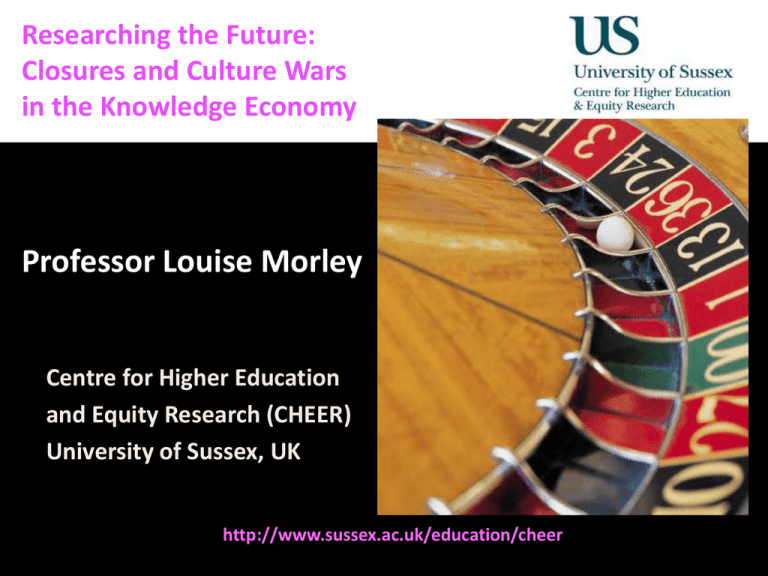
Researching the Future: Diversity, and Difference: Theories and Methodologies Closures and Democratisation Culture Wars in the Knowledge Economy Professor Louise Morley Centre for Higher Education and Equity Research (CHEER) University of Sussex, UK http://www.sussex.ac.uk/education/cheer Provocations: Neo-liberal/ Austerity Research Economies? • • • • • Who is defining the field of social research? Who are the standard makers? What are the dispersed control practices? Where are the epistemic exclusions? Is globalisation of scientised knowledge accelerating a rationalisation of the social world? • Dangers of normative reproduction/ intellectual closures in a global economy? • Return of the paradigm wars/ Certainties of scientism? • Is the ‘gold-standard’ of research methods now the randomised controlled trial (Colley, 2013)? Economics Imperialism • Research colonised by the ‘cultural circuits’ of capitalism (Mills and Ratcliffe, 2012)? • Instrumentalisation of knowledge/ Quantifiable use value. • Research funded for government priorities e.g. security? • Non-economics scholarship becoming unfundable or unknowable? • Counter-hegemonic/ critical scholarship in danger of becoming ‘socially illegitimate’ (Butler, 2006). Value, Not Values Research productivity = • Income-generation • Indictor for performance management/ calculative practice • Exchange in the global prestige economy • Innovation for the market • Activity reduced to a common managerial metric. • Impact Where is? • Creativity • Discovery • Pleasure • Intellectual contribution • Social justice (Collini, 2013; Leathwood & Read, 2013; Lucas, 2006) Peer Reviewers: Assemblage of Regulation? • Democratising intervention disguising steering at a distance. • Measuring apparatus constituted through norms, practices and epistemologies. • Digital technology circulates disembodied and de-territorialised feedback. • Scarce resources capriciously allocated by non-accountable and non-transparent processes. • Externality problematic in resourceconstrained economies? • Reluctance to sign over competitive advantage to other researchers? • Determine what remains outside of the domain of intelligibility. • Captured by hegemony? What Does Research do to Academic Identities? • Pride • Material rewards/ resources • Leadership • Credentialisation • Accumulation of (portable) academic capital • Research success = the good life. Affective Ecologies: Shame • Mobilised, via a calculus of success or management by numbers (Cooke, 2013). • Relationship with indebtedness. (Probyn, 2005; Mantyla, 2000) • Individualising- the failure to win grants or publish. • Collective – the lack of cumulative progress in the social sciences to eliminate social problems (Carrigan, 2013). • Institutions falling down the global league tables (Adams, 2013). • Culture of governance by fear (Braidotti, 2012). Can Foucault be invoked to help deconstruct the corrosive micropolitical experiences and govermentalities that are symptomatic of broader cultural clashes and the closure of counter-hegemonic discursive space in the global research economy? FOUCAULT Optimism takes the phenomenological form of a ‘knotty tethering to objects, scenes, and modes of life that generate so much overwhelming yet sustaining negation’ (Berlant, 2011, 52). ‘The faith that adjustment to certain forms or practices of living and thinking will secure one’s happiness’ (Berlant, 2002:75). CRUEL OPTIMISM Academic Desire = Stupid Optimism? • Researchers positioned as supplicants for diminishing/ highly targeted public resources. • Participation in self-frustrating and punitive research funding regimes. • Logic of relationality = for every winner there are many losers. • Empty signifier of excellence invoked value indicators unstable, transitory, contingent and contextualised. • Illusio = investing in the game involves performativities (Bourdieu, 1977; Colley, 2013) • Game seldom leads to acquisition or success. Epistemic Exclusions: Precarious Academics • Who is deemed capable of reason/ cast as un/reliable knowers? • 71% of researchers globally are men • 29% women (UNESCO, 2012). Women less likely to be: Journal editors/cited in top-rated journals (Tight, 2008). Principal investigators (EC, 2011, 2013). On research boards Awarded large grants UK- Across all age and grant categories, women averaged a 25% success rate, compared with men's 29% (RCUK, 2014). Awarded research prizes (Nikiforova, 2011). Keynote conference speakers (Schroeder et al., 2013). Evidence • Rigorous Literature Review – British Council and Leadership Foundation for Higher Education (Morley, 2013) • Transcribed Panel/ Group Discussions in British Council Seminars (Hong Kong, Tokyo and Dubai). • 20 questionnaires: Australia, China, Egypt, Hong Kong, Indonesia, Japan, Jordan, Kuwait, Malaysia, Morocco, Pakistan, Palestine, the Philippines, Singapore, Thailand and Turkey. • Sample= current/ previous vicechancellors, deputy vice-chancellors, deans, research directors and mid and early career academic women located in social sciences, humanities and STEM. (Morley, 2014) Circular relationship between the exclusion of groups from prestigious relay points in the knowledge economy and the reproduction of the norms that define the field. Distributive and Epistemic Injustice • Opaqueness in decisionmaking/lack of transparency/ accountability of funders. • Gender bias in assessment of excellence/peer review. • Gendered division of labour/ horizontal segregation. • Institutional practices e.g. shortterm contracts/ inward-facing responsibilities. • Privileging of male-dominated disciplines e.g. STEM. Manifesto for Change: Accountability, Transparency, Development and Data Equality as Quality - equality should be made a Key Performance Indicator (KPI) in quality audits, with data to be returned on percentage and location of women professors and leaders, percentage and location of undergraduate and postgraduate students and gender pay equality. Gender equity achievements should be included in international recognition and reputation for universities in league tables. Research Grants - funders should monitor the percentage of applications and awards made to women and to actively promote more women as principal investigators. The applications procedures should be reviewed to incorporate a more inclusive and diverse philosophy of achievement. Gender implications and impact should also be included in assessment criteria. Journals - Editorial Boards, and the appointment of editors, need more transparent selection processes, and policies on gender equality e.g. to keep the gender balance in contributions under review. Data - a global database on women and leadership in higher education should be established. Development - more investment needs to be made in mentorship and leadership development programmes for women and gender needs to be included in existing leadership development programmes. Mainstreaming - work cultures should be reviewed to ensure that diversity is mainstreamed into all organisational practices and procedures. Impact of Neo-liberal/ Austerity Exclusionary Research Cultures • Research makes the world intelligible in specific ways and contributes to the foreclosure of other patterns of intelligibility (Rouse, 2004). • Beneficence of state patronage only for those sharing the values of the new times? • How to defend the autonomy of the field of the production of research against heteronomy and control practices that masquerade as democratisation? Making Alternativity Imaginable: How Can Social Science Researchers… • Trouble neo-liberal realism. • Resist being co-opted by narrow research policy agendas. • Inform policy with evidence, not vice versa. • Challenge and expose increasing socioeconomic inequalities/ exclusions. • Re-invigorate knowledge production as a site of transformation/ possibility. • Act as Socratic ‘gadflies’ (Colley, 2013). • Transgress and re-signify. • Re-work tired, stale categories/ vocabularies. • Identify new optics for viewing social world. • Imagine and research the future that you want to see. CHEER http://www.sussex.ac.uk/education/cheer/
![Researching the Future: Towards an Inclusive Global Knowledge Economy [PPT 8.88MB]](http://s2.studylib.net/store/data/015063392_1-7b83cd14f5c0d818107eea3bccf83918-300x300.png)
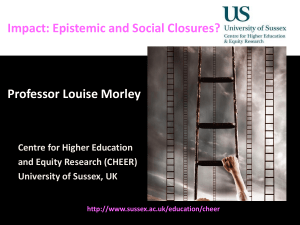
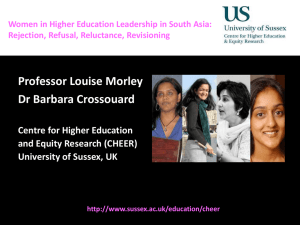
![Professor Louise Morley: The Knowledge Economy - Democratisation, Distributive Justice or Domination [PPT 10.04MB]](http://s2.studylib.net/store/data/015085244_1-ec5f456fdbe84eb0db17225130e4009a-300x300.png)


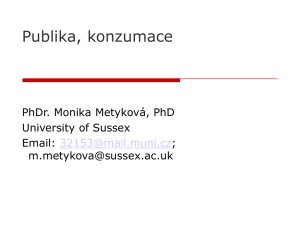
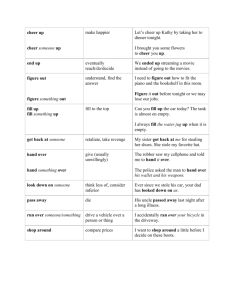

![Troubling the concept: Students' experiences of critical thinking in higher education [PPTX 1.24MB]](http://s2.studylib.net/store/data/015063390_1-2996359b37448557fef6634027d04984-300x300.png)
